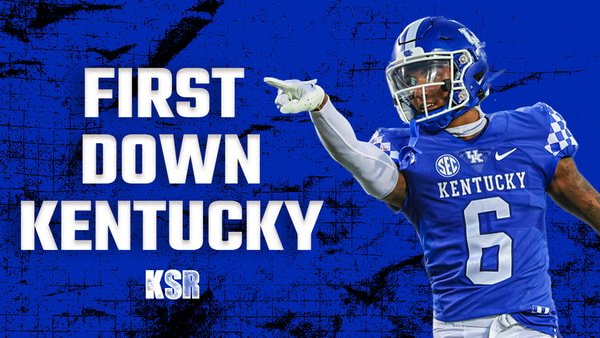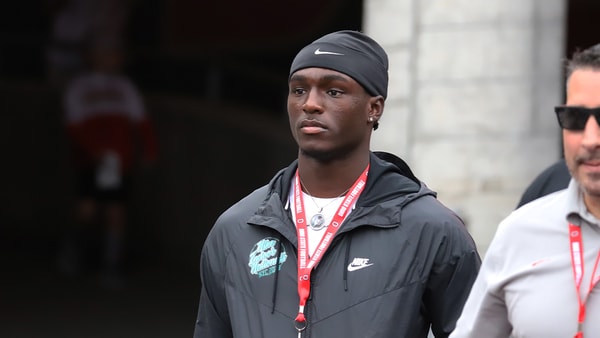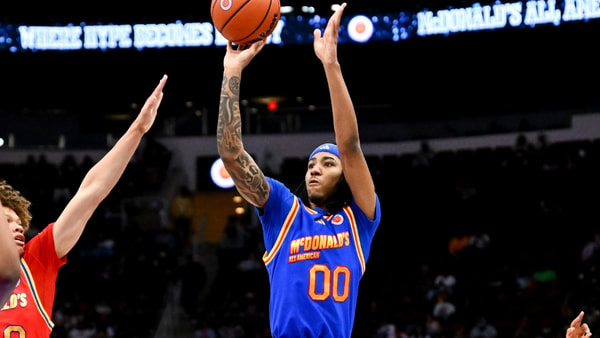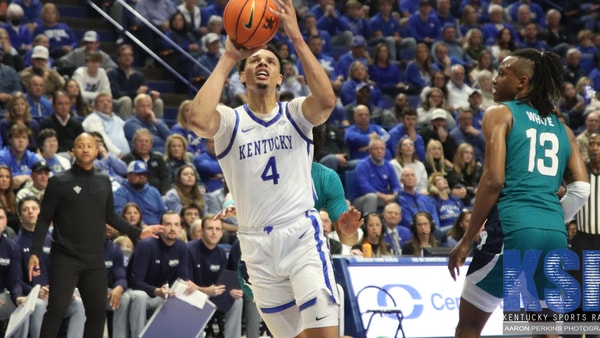 (Perhaps you're not one that enjoys reading about stats, so in case you are that type of person I present to you this Louisville fan doing her "Didn't Read! LOL!" dance.)
(Perhaps you're not one that enjoys reading about stats, so in case you are that type of person I present to you this Louisville fan doing her "Didn't Read! LOL!" dance.)
Over the past few weeks I have been running somewhat of a continuous series researching numerous occurrences in college football like what, statistically speaking, wins the most games and the play distributions of all 599 teams since the 2007 season. Last week in particular while addressing why teams that win seemingly all have high rushing yard per game totals a person in the comment section named "UKHomer" pointed out a general observation that teams who win more tend to rush often, strategically running down the clock once a lead had been built, likewise teams losing more often than not pass frequently to catch up. This is a very interesting point when examining elite/BCS bowl teams and why they all seemingly have higher rushing yards per game totals.
So I conducted an experiment to investigate whether this phenomenon could be explained through their play calling in the first and second half.
To compile all of this data, I give my thanks to the crew over at
CFBStats.com, who have tons of raw data on just about anything college football related (although they have little advanced data, but I have no problem calculating that fun stuff myself). One of the many things they have compiled are the number of plays called in first and second half for every FBS team. After gathering that raw information for all of the teams who have competed in BCS bowls since 2007 (they're the elite after all, except you 8-4 UConn), I computed those into percentages to make the data more understandable. After doing this I noticed that
all teams who have competed in the BCS since 2007 have something in common, every single solitary one of them passed fewer times in the second half than they did the first (50 out of 50). First note that this is not a game by game evaluation, it looks at the whole season, there are teams who passed more times in the second half in single games. But, over the course of the season they passed fewer times in the second half.
First here is the
spreadsheet containing the numbers. Why is it that teams who win more seemingly rush more? Does running more in the second half magically translate into wins? Not at all, here's why. A common theme usually present in BCS caliber teams is their margin of victory and the ability to obtain that margin quickly. All very recent BCS teams have shown that when the game is largely in question (first half) they are a more balanced team than they are in the second half when the game is usually out of reach for the opponent. This compliments the earlier point that teams who win are rushing more often to run the clock down.
It's also interesting to point out that the teams playing in the national title game usually see the largest drop in second half passing, most likely because the game is "over" much earlier than their other BCS brothers. Also note that teams like 2007 LSU and 2010 Connecticut see small drops due to the fact that many of their games were highly contested. So it really does appear as though margin of victory plays a massive role in play calling.
So why is it that teams who play for, and win the national title, are usually near the top of the national list in rushing yards per game? I believe a big portion of it has to do with margin of victory. Since the teams playing for the title usually beat their opponents handily and early in the game, they will rush more to expire the clock. This is not the only factor in yards per game, though. Yards per attempt plays greatly into this as well. After all you can't keep running the ball, inflating your rush yards per game numbers, without advancing the ball efficiently. There are many factors that go into winning football, rushing yards per game is certainly not the sole reason for victory.
But, when looking at rush yards per game in evaluation, be extremely careful, as it may only tell you who beats their opponent faster. (Perhaps you're not one that enjoys reading about stats, so in case you are that type of person I present to you this Louisville fan doing her "Didn't Read! LOL!" dance.)
Over the past few weeks I have been running somewhat of a continuous series researching numerous occurrences in college football like what, statistically speaking, wins the most games and the play distributions of all 599 teams since the 2007 season. Last week in particular while addressing why teams that win seemingly all have high rushing yard per game totals a person in the comment section named "UKHomer" pointed out a general observation that teams who win more tend to rush often, strategically running down the clock once a lead had been built, likewise teams losing more often than not pass frequently to catch up. This is a very interesting point when examining elite/BCS bowl teams and why they all seemingly have higher rushing yards per game totals. So I conducted an experiment to investigate whether this phenomenon could be explained through their play calling in the first and second half.
To compile all of this data, I give my thanks to the crew over at CFBStats.com, who have tons of raw data on just about anything college football related (although they have little advanced data, but I have no problem calculating that fun stuff myself). One of the many things they have compiled are the number of plays called in first and second half for every FBS team. After gathering that raw information for all of the teams who have competed in BCS bowls since 2007 (they're the elite after all, except you 8-4 UConn), I computed those into percentages to make the data more understandable. After doing this I noticed that all teams who have competed in the BCS since 2007 have something in common, every single solitary one of them passed fewer times in the second half than they did the first (50 out of 50). First note that this is not a game by game evaluation, it looks at the whole season, there are teams who passed more times in the second half in single games. But, over the course of the season they passed fewer times in the second half.
First here is the spreadsheet containing the numbers. Why is it that teams who win more seemingly rush more? Does running more in the second half magically translate into wins? Not at all, here's why. A common theme usually present in BCS caliber teams is their margin of victory and the ability to obtain that margin quickly. All very recent BCS teams have shown that when the game is largely in question (first half) they are a more balanced team than they are in the second half when the game is usually out of reach for the opponent. This compliments the earlier point that teams who win are rushing more often to run the clock down. It's also interesting to point out that the teams playing in the national title game usually see the largest drop in second half passing, most likely because the game is "over" much earlier than their other BCS brothers. Also note that teams like 2007 LSU and 2010 Connecticut see small drops due to the fact that many of their games were highly contested. So it really does appear as though margin of victory plays a massive role in play calling.
So why is it that teams who play for, and win the national title, are usually near the top of the national list in rushing yards per game? I believe a big portion of it has to do with margin of victory. Since the teams playing for the title usually beat their opponents handily and early in the game, they will rush more to expire the clock. This is not the only factor in yards per game, though. Yards per attempt plays greatly into this as well. After all you can't keep running the ball, inflating your rush yards per game numbers, without advancing the ball efficiently. There are many factors that go into winning football, rushing yards per game is certainly not the sole reason for victory. But, when looking at rush yards per game in evaluation, be extremely careful, as it may only tell you who beats their opponent faster.
(Perhaps you're not one that enjoys reading about stats, so in case you are that type of person I present to you this Louisville fan doing her "Didn't Read! LOL!" dance.)
Over the past few weeks I have been running somewhat of a continuous series researching numerous occurrences in college football like what, statistically speaking, wins the most games and the play distributions of all 599 teams since the 2007 season. Last week in particular while addressing why teams that win seemingly all have high rushing yard per game totals a person in the comment section named "UKHomer" pointed out a general observation that teams who win more tend to rush often, strategically running down the clock once a lead had been built, likewise teams losing more often than not pass frequently to catch up. This is a very interesting point when examining elite/BCS bowl teams and why they all seemingly have higher rushing yards per game totals. So I conducted an experiment to investigate whether this phenomenon could be explained through their play calling in the first and second half.
To compile all of this data, I give my thanks to the crew over at CFBStats.com, who have tons of raw data on just about anything college football related (although they have little advanced data, but I have no problem calculating that fun stuff myself). One of the many things they have compiled are the number of plays called in first and second half for every FBS team. After gathering that raw information for all of the teams who have competed in BCS bowls since 2007 (they're the elite after all, except you 8-4 UConn), I computed those into percentages to make the data more understandable. After doing this I noticed that all teams who have competed in the BCS since 2007 have something in common, every single solitary one of them passed fewer times in the second half than they did the first (50 out of 50). First note that this is not a game by game evaluation, it looks at the whole season, there are teams who passed more times in the second half in single games. But, over the course of the season they passed fewer times in the second half.
First here is the spreadsheet containing the numbers. Why is it that teams who win more seemingly rush more? Does running more in the second half magically translate into wins? Not at all, here's why. A common theme usually present in BCS caliber teams is their margin of victory and the ability to obtain that margin quickly. All very recent BCS teams have shown that when the game is largely in question (first half) they are a more balanced team than they are in the second half when the game is usually out of reach for the opponent. This compliments the earlier point that teams who win are rushing more often to run the clock down. It's also interesting to point out that the teams playing in the national title game usually see the largest drop in second half passing, most likely because the game is "over" much earlier than their other BCS brothers. Also note that teams like 2007 LSU and 2010 Connecticut see small drops due to the fact that many of their games were highly contested. So it really does appear as though margin of victory plays a massive role in play calling.
So why is it that teams who play for, and win the national title, are usually near the top of the national list in rushing yards per game? I believe a big portion of it has to do with margin of victory. Since the teams playing for the title usually beat their opponents handily and early in the game, they will rush more to expire the clock. This is not the only factor in yards per game, though. Yards per attempt plays greatly into this as well. After all you can't keep running the ball, inflating your rush yards per game numbers, without advancing the ball efficiently. There are many factors that go into winning football, rushing yards per game is certainly not the sole reason for victory. But, when looking at rush yards per game in evaluation, be extremely careful, as it may only tell you who beats their opponent faster.







Discuss This Article
Comments have moved.
Join the conversation and talk about this article and all things Kentucky Sports in the new KSR Message Board.
KSBoard